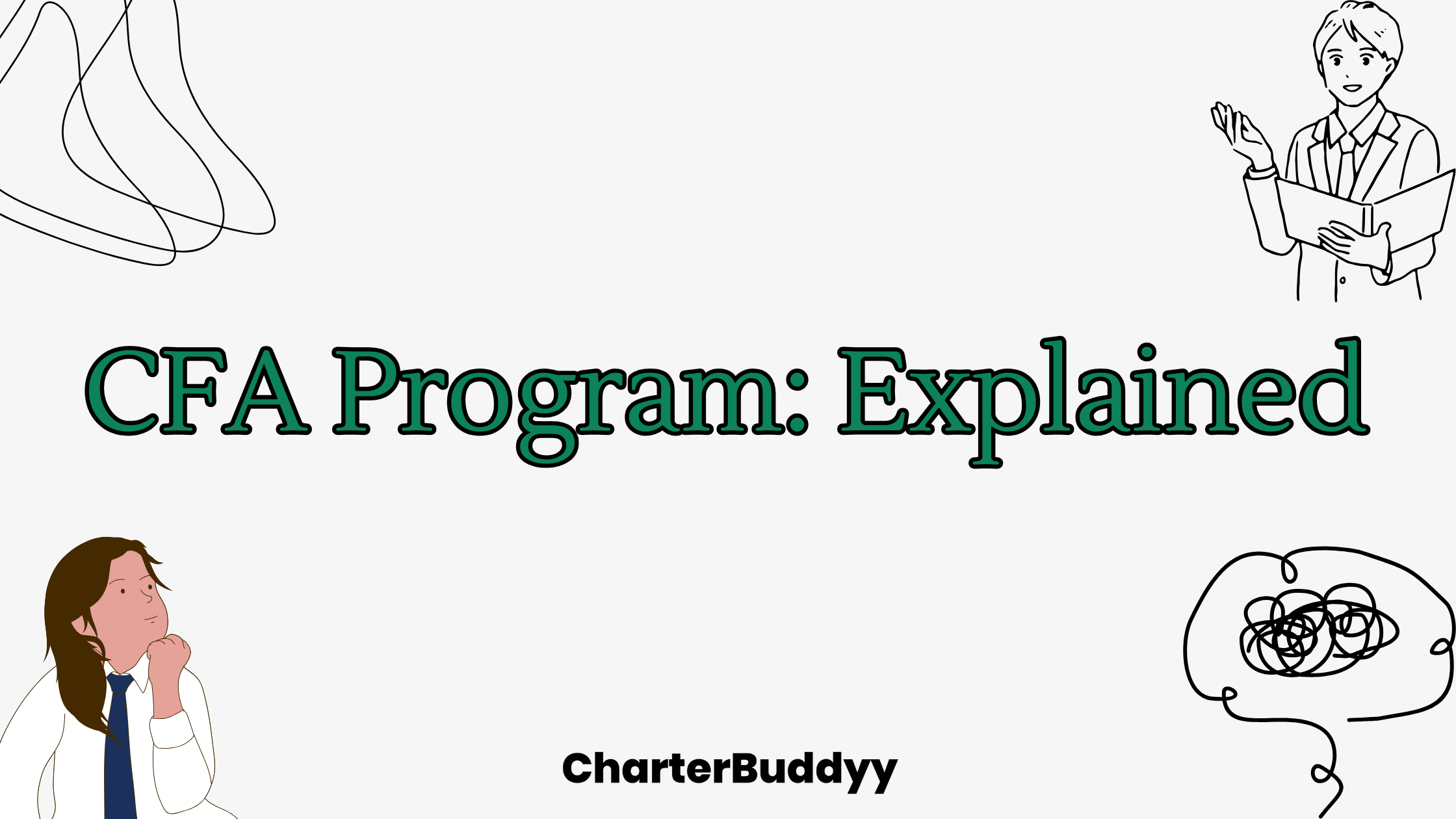
TThe Chartered Financial Analyst (CFA) program is one of the most prestigious certifications in the finance world. Comprising three levels of rigorous exams, this program equips candidates with in-depth knowledge of the financial industry. Completing the CFA program and fulfilling additional requirements grants the globally recognized CFA charter, opening doors to unparalleled career opportunities.
In this blog, we’ll explore what the CFA program means, key details about the program, and how it can elevate your career in finance.
What is the CFA Program?
The CFA program is a globally recognized professional certification offered by the CFA Institute. Its comprehensive curriculum and challenging exams attract finance professionals worldwide, making the CFA designation a standard in the finance industry. With its competitive structure and low pass rates, the CFA program creates an elite network of top financial professionals.
But don't let the challenge deter you! With focus, preparation, and dedication, you can join this exclusive group and unlock career opportunities in finance globally.
CFA Exam Structure
The CFA program comprises three levels of exams, each designed to test a candidate's knowledge and analytical abilities in core finance areas:-
Level 1
- Format: 180 multiple-choice questions
- Structure: Two sessions of 2 hours 15 minutes each (90 questions per session)
-
Level 2
- Format: Vignette-based (case study) multiple-choice questions
- Structure: Two sessions of 2 hours 12 minutes each (44 questions per session)
-
Level 3
- Format: Vignette-based questions with a mix of essays and MCQs
- Structure: 6 item sets and 5 essay sets, or vice versa
For more details on the Level 3 structure, check out this comprehensive guide by Soledea.org
CFA Program Costs
The total cost of the CFA program ranges from $3,000 to $6,000, depending on:- Early bird registration discounts
- The number of attempts per level
Note: Fees are based on 2025 rates and will increase from 2026. Click here for more details on CFA program costs.
Subjects Covered in the CFA Curriculum
The CFA program offers a deep dive into core financial subjects. While topics across Levels 1 and 2 remain the same, their respective weights in the exam change.Level 3 introduces key advanced topics, along with the option for choosing pathways. Pathways are specialized topics that enable candidates to learn according to career aspirations and interests.
Here's a breakdown of subjects across the three levels and their respective weight in the exam:
| LEVEL 1 | LEVEL 2 | LEVEL 3 |
|---|---|---|
| Alternative Investments[7-10%] | Alternative Investments[5-10%] | Asset Allocation[15–20%] |
| Corporate Issuers[6-9%] | Corporate Issuers[5-10%] | Portfolio Construction[15–20%] |
| Derivatives[5–8%] | Derivatives[5-10%] | Performance Measurement[5–10%] |
| Economics[6-9%] | Economics[5-10%] | Derivatives and Risk Management[10–15%] |
| Equity Investments[11-14%] | Equity Investments [10-15%] | Ethical and Professional Standards [10–15%] |
| Ethical and Professional Standards [15-20%] | Ethical and Professional Standards [10–15%] | Pathways (Portfolio Management/Private Markets /Private Wealth) [30-35%] |
| Financial Statement Analysis [11-14%] | Financial Statement Analysis [10-15%] | |
| Fixed Income [11-14%] | Fixed Income [10-15%] | |
| Quantitative Methods [6-9%] | Quantitative Methods [5-10%] | |
| Portfolio Management [8-12%] | Portfolio Management and Wealth Planning [10-15%] |
These subjects prepare candidates for specialized roles in finance, ensuring they are well-equipped to tackle challenges in the industry.
Career Opportunities with a CFA Charter
A CFA charter opens doors to a variety of finance and investment roles, including:- Investment Banking
- Wealth Management
- Portfolio Management
- Equity Research
- Credit Analysis
- Trading and Brokerage
These roles leverage the specialized knowledge gained through the CFA curriculum, giving candidates a competitive edge in the job market.
Why Choose the CFA Program?
The CFA program stands out for its rigor, global recognition, and career-enhancing benefits. Here’s why it’s worth considering:-
Unparalleled Career Opportunities
-
Higher Earning Potential
-
Advanced Knowledge in Finance
-
Global Recognition
CFA charter holders are highly sought after for core finance jobs. Even candidates who clear two levels of the CFA program have an edge in the job market due to the program's comprehensive curriculum.
According to 300Hours.com, CFA charter holders and Level 3 candidates earn 57% more on average than their peers without the charter, even after removing work experience as a factor.
The CFA program provides unparalleled depth in finance subjects, outpacing other programs like MBAs in niche topics such as portfolio management, quantitative methods, and fixed income.
The CFA charter is a globally respected credential, granting candidates the ability to work in finance anywhere in the world.
Conclusion
The CFA program is challenging but immensely rewarding. By earning a CFA charter, you gain access to a global network of top financial professionals and open doors to prestigious roles in the finance industry.
However, completing the exams is only one part of the journey. Stay tuned for our next blog, where we’ll explore the additional requirements for earning your CFA charter.
At CharterBuddyy, we are here to guide you every step of the way on your CFA journey. Check out our other blogs for more tips, resources, and insights to help you succeed.
Table of Contents
- What is the CFA Program?
- CFA Exam Structure
- CFA Program Costs
- Subjects Covered in the CFA Curriculum
- Career Opportunities with a CFA Charter
- Why Choose the CFA Program?
- Conclusion

